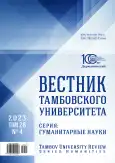Selection and adaptation of teaching materials for content and language integrated learning
- Authors: Baydikova T.V.1, Makarova E.L.1
-
Affiliations:
- Voronezh State Agrarian University named after Emperor Peter the Great
- Issue: Vol 28, No 4 (2023)
- Pages: 833-844
- Section: THEORY AND METHODS OF FOREIGN LANGUAGE TEACHING
- URL: https://journal-vniispk.ru/1810-0201/article/view/298012
- DOI: https://doi.org/10.20310/1810-0201-2023-28-4-833-844
- ID: 298012
Cite item
Full Text
Abstract
Importance. Language teaching in higher education is aimed not only to promote the development of communicative competence at medium and high levels, but also to be a way of familiarizing students with specialized foreign language discourse. One of the most common methods that can accomplish these two tasks is Content and Language Integrated Learning. With its help, it is possible to adapt authentic materials to the requirements of linguodidactics. However, the question of the procedure for creating teaching materials for an integrated course remains open – there is a need to determine the general properties of selected and adapted texts for Content and Language Integrated Learning.Research methods. The research is based on the scientific literature devoted to the organization of the integrated learning course. The connections between the systems of materials creation proposed by various authors were revealed via comparative analysis.Results and Discussion. In the course of the study, a list of the properties of educational texts necessary for effective teaching of a professional foreign language was established. Different models of selection, ordering and adaptation of authentic texts are also considered. The correlation of the variety of properties and methods of organizing materials led to the creation of a three-module system that includes content, cognitive and communicative components. Each of the components operates with special characteristics of the selected and adapted texts: content – professional relevance of the texts; cognitive – the potential novelty of the perceived material; communicative – language and speech means to create communication environment.Conclusion. The proposed three-module system of adaptation of authentic materials for Content and Language Integrated Learning is able to cover a variety of characteristics of texts, thereby providing opportunities for effective organization of the educational process.
About the authors
T. V. Baydikova
Voronezh State Agrarian University named after Emperor Peter the Great
Email: november22@rambler.ru
ORCID iD: 0000-0002-2821-8250
PhD (Education), Associate Professor of Russian and Foreign Languages Department
1 Michurina St., Voronezh, 394087, Russian FederationE. L. Makarova
Voronezh State Agrarian University named after Emperor Peter the Great
Author for correspondence.
Email: maklena79@yandex.ru
ORCID iD: 0000-0003-0764-3028
PhD (Education), Associate Professor of Russian and Foreign Languages Department
1 Michurina St., Voronezh, 394087, Russian FederationReferences
- Lapshova A.V., Urakova E.A., Kraeva I.A. (2021). Features of the competence approach in professional education. Problemy sovremennogo pedagogicheskogo obrazovaniyu = Problems of Modern Pedagogical Education, no. 72-3, pp. 214-216. (In Russ.) https://elibrary.ru/ymhuvx
- Sysoev P.V. (2019). Controversial issues of the introduction of content and language integrated learning approach to teaching foreign language professional communication in Russia. Yazyk i kul’tura = Language and Culture, no. 48, pp. 349-371. (In Russ.) https://doi.org/10.17223/19996195/48/22, https://elibrary.ru/yjnxlx
- Potapova E.N. (2021). Framework for designing bespoke corporate foreign language courses. Vestnik Tambovskogo universiteta. Seriya: Gumanitarnye nauki = Tambov University Review: Series Humanities, vol. 26, no. 193, pp. 15-28. (In Russ.) https://doi.org/10.20310/1810-0201-2021-26-193-15-28, https://elibrary.ru/xrmmmp
- Baidikova T.V. (2019). Methodical model for teaching foreign professional communication students of “Agricultural Engineering” programme based on content and language integrated learning. Vestnik Tambovskogo universiteta. Seriya: Gumanitarnye nauki = Tambov University Review: Series Humanities, vol. 24, no. 181, pp. 55-67. (In Russ.) https://doi.org/10.20310/1810-0201-2019-24-181-55-67, https://elibrary.ru/fypxev
- Sysoev P.V. (2020). Stages of the development of teaching materials for content and language integrated learning. Vestnik Moskovskogo universiteta. Seriya 19. Lingvistika i mezhkul’turnaya kommunikatsiya = Moscow State University Bulletin. Series 19. Linguistics and Intercultural Communication, no. 3, pp. 169-178. (In Russ.) https://elibrary.ru/kvbrcl
- Mehisto P. (2012). Criteria for producing CLIL learning material. Encuentro, no. 21, pp. 15-33.
- Zav’yalov V.V. (2018). Selection features of the subject side of the content of English teaching to students of “jurisprudence” programme. Vestnik Tambovskogo universiteta. Seriya: Gumanitarnye nauki = Tambov University Review: Series Humanities, vol. 23, no. 177, pp. 30-38. (In Russ.) https://doi.org/10.20310/1810-0201-2018-23-177-30-38, https://elibrary.ru/yorlid
- Tokmakova Yu.V. (2019). Subject content of teaching english language to students of “Technology of production and processing of agricultural products” programme. Vestnik Tambovskogo universiteta. Seriya: Gumanitarnye nauki = Tambov University Review: Series Humanities, vol. 24, no. 183, pp. 35-44. (In Russ.) https://doi.org/10.20310/1810-0201-2019-24-183-35-44, https://elibrary.ru/maqpxk
- Maksaev A.A. (2019). Content design of foreign language academic programmes for students at the musical universities. Vestnik Tambovskogo universiteta. Seriya: Gumanitarnye nauki = Tambov University Review: Series Humanities, vol. 24, no. 179, pp. 58-68. (In Russ.) https://doi.org/10.20310/1810-0201-2019-24-179-58-68, https://elibrary.ru/yzesex
- Sysoev P.V., Zav’yalov V.V. (2018). Teaching foreign language written legal discourse to law students. Yazyk i kul’tura = Language and Culture, no. 41, pp. 308-326. (In Russ.) https://doi.org/10.17223/19996195/41/19, https://elibrary.ru/xymcmx
- Coyle D., Hood P., Marsh D. (2010). Content and Language Integrated Learning. Cambridge, Cambridge University Press, 173 p.
- Pladevall-Ballester E., Vallbona A. (2016). CLIL in minimal input contexts: a longitudinal study of primary school learners’ receptive skills. System, № 58, pp. 37-48. https://doi.org/10.1016/j.system.2016.02.009
- Lancaster N.K. (2018). Extramural exposure and language attainment: the examination of input-related variables in CLIL programmes. Porta Linguarum, № 29, pp. 91-114. http://dx.doi.org/10.30827/Digibug.54024
- Czura A. (2017). Translation is not enough – the need for pedagogical adaptation in CLIL textbook development. Porta Linguarum, № 27, pp. 35-46. http://dx.doi.org/10.30827/Digibug.53950
Supplementary files








